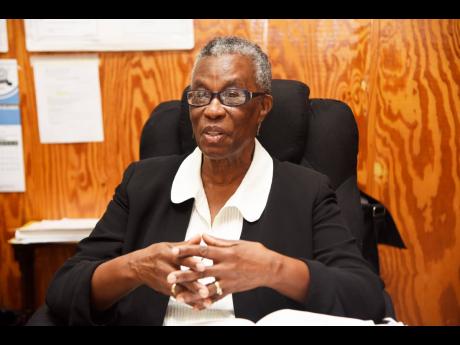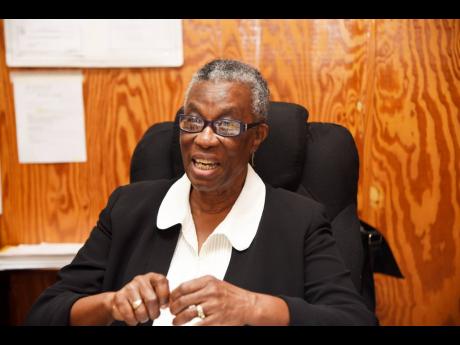Leading the Moravian Church resurrection
Scandal-scarred denomination rising from sexual abuse shame
Today is being observed as Resurrection Sunday in Christendom as followers of Jesus Christ celebrate His victory over death by crucifixion and His ascension to be at the right hand of the Father, making intercession for all who seek Him.
Symbolically, it was a woman – Mary Magdalene – who was among a group of persons who discovered Jesus’ empty tomb three days after His death.
The Reverend Phyllis Smith Seymour is not Mary Magdalene, but she sits at the helm of the Moravian Church in Jamaica, the first woman to occupy such a position.
The last five years have been the worst locally for the denomination, whose roots in the island go back some 268 years. Stained by charges of sexual misconduct levelled against some of its leaders, many Moravians hid their faces in shame.
As the scandal took wind, it mattered not the good the church did – and continue to do – over centuries in the island, including establishing the first school for black children at Rowe’s Corner in Manchester in 1823. Instead, as the accusations spread like a bush fire, the Church retreated in shame, anger, disgust and disbelief.
But Smith Seymour has rallied the troops to forgive and embrace the perpetrators, the accused, the accusers and the families of those victimised – at least those who want to be embraced.
And on today’s Resurrection Sunday, the Moravian Church is still rising from the tomb of scandal.
The soft-spoken Smith Seymour said that arising from that unfortunate period, a document was developed outlining protocols to handle any future such accusations.
“The Church of the Living God will always go through the storms and come out. Recovery, for us, is a journey, and I think, to an extent, we are recovering,” she told The Sunday Gleaner recently.
In 2017, three Moravian ministers were facing sexual misconduct charges in the courts.
In 2018, one was given two concurrent eight-year sentences after being convicted on two counts of having sex with a person under 16 years old.
The other two accused, who were forced to step away from national duties, are yet to be tried.
“It impacted the Church badly and we are ashamed for things that happened. We are ashamed for families that got hurt and other persons who were hurt. We are also thinking of our pastors. We share with the families who have been impacted and many Moravians mourned, cried and prayed. But we have learned from that, and we now have a childcare and protection policy in place and we ask that everything – for camps, our own local congregations – that there are some protocols that must be followed. Persons must report through the right channels,” Smith Seymour explained.
Those channels include going to the police if a report is made to a local minister, who does not appear to be taking any action.
There should be no appearance of any cover-up, she insisted.
“The two [remaining] pastors work with us. We couldn’t throw them under the bus because at this stage it is still accusations. They work with the church, not in pastoral roles, but we have been embracing them. It is part of the healing and forgiveness process. Every now and then a wound is reopened because the case is still to be determined,” she disclosed.
“It was really painful because we thought our children were safe – and they were, especially in years gone by. The community played a more important role back then. I walked a mile and half to school alone, and nobody dared trouble me, as neighbours looked out for me and each other.”
Churches, she said, must continue to give wholesome spiritual care, adding, too, that forgiveness is a beautiful thing.
And as all are part of the imperfect human race, Smith Seymour is reluctant to point fingers in judgement.
Igniting the flame, charting her course
Born in Carisbrook, St Elizabeth, Smith Seymour comes from a huge family, living with her eight brothers and a sister, raised by her mother and stepfather.
Home, for her, was never a quiet place, as oftentimes there were at least 12 persons around.
Church was an integral part of her upbringing and the family religiously made the mile-and-a-half trek to worship, never missing a Sunday.
“Church and school were the hotspots for me. Because it was so deeply rural, you get to meet and greet there. Involvement at church began from very early. You learned to recite; we took part in pageants; and school was still very much a part of church, as it was a Moravian school. I learned to love the Lord from very early,” she told The Sunday Gleaner.
A lover of netball, Smith Seymour also played softball and cricket. Sewing, cooking and other skills were taught at school.
Her deeply religious mother took her aside, she recalled, and imparted biblical knowledge. Even as her hair was being combed in the mornings, the young Smith Seymour would read from the Bible and be quizzed by her mother, who was adamant that her daughter should not make the same mistakes she did.
Discouraged by bishop
Her mother encouraged her to get an education, convince that it would open doors.
At age 18, Smith Seymour decided that she wanted to be a minister of religion. That fire would not be put out even when she was discouraged by the bishop, who advised her that the Moravian Church did not ordain women ministers.
She was encouraged to instead become a deaconess, a limited role, as these persons only dealt with women, girls and children’s issues.
That did not appeal to Smith Seymour and she went to Bethlehem Moravian College to study to become a teacher.
Afterwards, she taught at Christiana Moravian Primary School before becoming a youth organiser for the church. Six years later, she went back to teaching – this time at the college she studied.
In 1995-1996, she went into training for ministry and was ordained in 1997.
Smith Seymour told The Sunday Gleaner that she wanted to be like the “excellent ministers” she knew growing up.
“The church has always been involved in teaching. The other churches have influenced us, in terms of music. I grew up with the hymn book and we learned and sang hymns. We had piano and organs. The more contemporary churches now have drums, guitars, keyboards, and when I was growing up, I was attracted to some of that when a new church started in my area,” she recalled.
Aspects of the Moravian Church have been influenced by contemporary practices.
Shouting while preaching is unfamiliar and Smith Seymour still does not enjoy such a practice today.
“I have never been like that because I don’t know that it is necessary. But a number of Moravians prefer the fiery preaching. We have some good ministers, too, who preach that way, who are very emotive on the pulpit. But I learnt from I was very young that Christianity is a way of life. We must look out and care for our neighbours and help those who are less fortunate,” she explained.
The changing times
Smith Seymour believes that up to three decades ago, it was easier to live a Christian life. Today, human nature has made it harder to trust.
Recently, she encountered a woman selling on the road with her nine-year-old son at her side. After enquiring why the lad was not in school, she was told that he had neither uniform nor a device for online school.
Moved to assist, a sixth sense told Smith Seymour not to turn over the money, but to instead make a promise to get the uniform.
The mother asked for even half the money instead, but she still did not give her.
More than six weeks have passed since and the woman has not turned up to collect the uniform.
Smith Seymour also recalled bathing children in need of care in St Elizabeth, noting that rural folks take less offence to offers of assistance to their children.
She also refrain from passing judgement on churches.
“I think I am a bit more liberal because I believe in Heaven. You will have Christians, Muslims, Hindus, and so who I am to judge?” she said.
Smith Seymour said that the local Moravian Church membership has dwindled over the years, with about 8,000 now in the faith. The majority of those are older persons and the changing times have impacted the congregations significantly. The children and grandchildren of the older Moravian faithful now attend other churches.
Her own husband did not start in the Moravian Church, either.
Looking at the wider society, she sees Jamaica’s descent into chaos and crudeness as a cause for worry.
“We have become a very segmented society, where nobody bothers with each other. The Christians don’t bother with the dancehall people and the persons who smoking out there. Those who have become middle class are leaving a class who have come up right by us...We are just not caring enough,” she bemoaned.
Barriers not the answer
Her interactions with the youth over the years have yielded insights into some of the real issues facing the society and its people. Erecting barriers is not the answer, she said.
“The Church must show people a better way and we must begin to make a difference,” Smith Seymour said.
The clergywoman believes much of the crime in the country can be solved if everyone plays their part, but the trust deficit has hindered the country’s progress. The police, for example, would get more tips if they were more trusted, she said.
“Even in families, we let go of the children as soon as they go to high school. And if they are doing well, we let them go even more. We don’t care about family and family values. We should never allow wrongdoers to feel that what they are doing inside our homes or communities is accepted,” she expressed.
She believes the education system has sadly failed us, as preferential treatment and access make it clear that some persons are more valued. Schools which started as junior secondary were especially devalued, she noted, as they experienced name changes without any real upgrades.
There are other things Smith Seymour finds puzzling, including why schools are failing when they have boards; why a school with 120 students does not have a guidance counsellor; or why some institutions have deans of discipline and others don’t.
“The social framework around schools is just broken. Why can’t there be more equity in the system? Until we do that, the guns will remain a choice for that boy who can’t go to school because he neither has bus fare nor lunch money. And even if he goes to school, he cannot get lunch provided by the school,” she said.
There was much more equity in years gone by, especially when the Moravians started schools, she said. But the short-sightedness of the Government and inadequate policies have let the citizenry down.
“Once we begin to fix education, we will begin to fix our communities and our nation. Everybody can’t get tertiary education, but fix the levels impacting most – early childhood, primary and secondary. If we don’t do that, I am not expecting Jamaica to be better in the near future, sad to say,” Smith Seymour shared.
It is her hope that Jamaica will be rescued before it’s too late.


